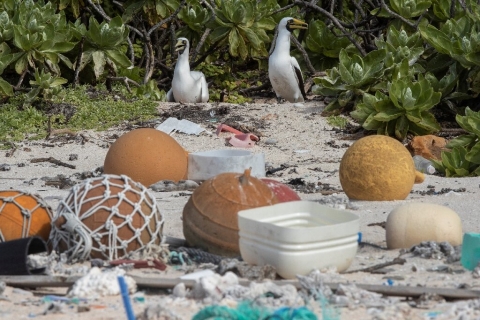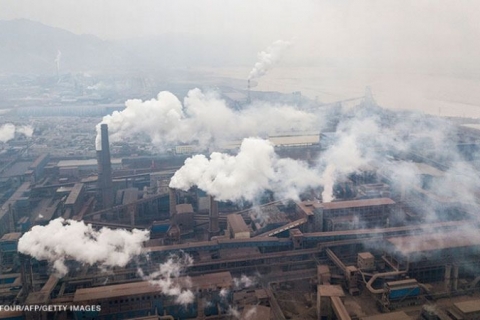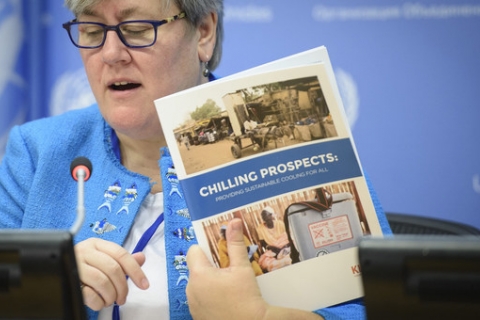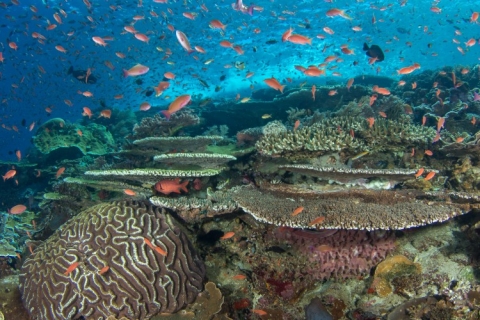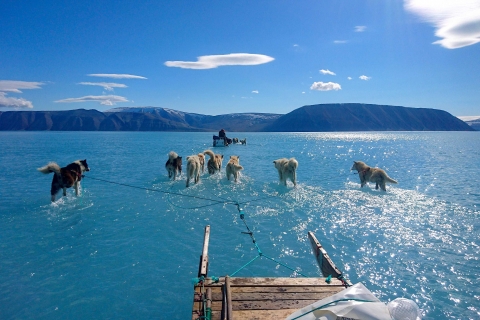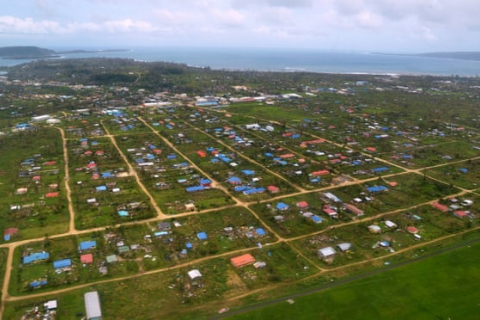- You are here:
- News & Events

- Harvested News

- Global
Global
Published on 1 August 2019
Floating plastic garbage has swamped a remote Pacific island once regarded as an environmental jewel and scientists say little can be done to save it while a throwaway culture persists. Henderson Island is an uninhabited coral atoll that lies almost exactly halfway between New Zealand and Peru, with 5,500 kilometers (3,400 miles) of the ocean in either direction. Despite its extreme isolation, a freak confluence…
Published on 1 August 2019 by Leah Asmelash and Brian Ries
If Earth's resources were a bank account, today would mark the date we'd officially be in the red. As of July 29, humanity has officially used up more ecological resources this year than the Earth can regenerate by the end of the year. The occasion even has a name: Earth Overshoot Day. The Global Footprint Network, a sustainability organization which calculates the day, says humanity…
Published on 25 July 2019
A new study from the World Bank and UN finds we’ll need ways to boost yields faster than ever before to prevent agricultural emissions from soaring. With the global population projected to increase by nearly 3 billion people by midcentury, demand for food—as well as the land and energy required to produce it—is to set to soar. If the world doesn’t figure out ways to…
Published on 3 July 2019
As global temperatures reach record highs, providing cooling systems which are effective, sustainable and which do not harm the environment is increasingly essential for everyday life. That’s according to Rachel Kyte, Chief Executive Officer of Sustainable Energy for All, and Special Representative of the United Nations Secretary-General for Sustainable Energy for All (SEforALL). From the cold chain systems that maintain uninterrupted refrigeration during the delivery…
Published on 3 July 2019
A new study released July 1 in Nature Climate Change gives hope for coral reefs. Launched by the nonprofit Coral Reef Alliance, with lead and senior authors at the University of Washington, the study is one of the first to demonstrate that management that takes evolution and adaptation into account can help rescue coral reefs from the effects of climate change. Importantly, the results show that by making…
Published on 25 June 2019
WASHINGTON: Greenland’s ice sheet may have completely melted within the next millennium if greenhouse gas emissions continue at their current rate, according to a new study with implications for sea-level rise around the world. The Greenland ice sheet holds the equivalent of seven meters (yards) of sea level. “If we continue as usual, Greenland will melt,” said lead author Andy Aschwanden, a research associate professor…
Published on 28 January 2019
Their favorite meal, herring, abounds, but climate change means both predator and prey must increasingly migrate further north. The clear and calm waters of Reisafjorden, in Norway’s Far North, have in recent years become the winter playground of the Scandinavian country’s killer whale population. At three degrees Celsius (37 Fahrenheit), the cold water is perfect for the herring which, ahead of the spawning…
Published on 15 January 2019
Scientists at the US-based advocacy group the Environmental Defense Fund suggest the short-term warming impact of these additional gases in the atmosphere could be equivalent to 1,200 coal power plants. Considering the importance of rice as a staple food crop, providing more calories to the global population than any other food, the researchers have recommended ways to adapt farming practices and make its cultivation…
Published on 14 January 2019
So far, advocates and politicians have tended to focus on reducing fossil fuel consumption through technology and/or policy, such as a steep carbon tax, as climate solutions. These proposals are, of course, essential to reducing manmade carbon emissions—71 percent of which are generated by just 100 fossil fuel companies. For this reason, fossil-fuel–related emissions reductions rightly figure heavily in the national climate commitments of the…
Published on 6 December 2018
The study examines 10 major climate-related issues facing farmers in Africa, Asia, and Latin America and proposes site-specific CSA remedies. These include rotating rice fields with peanuts in Vietnam, manual blight control for cacao in Nicaragua, and planting drought-tolerant varieties of beans and maize alongside each other in Uganda. Where additional investment is required, initial rates of return on investment range from 17 percent…
Published on 6 December 2018
The Annual Meetings took place in the wake of a new report published by the Intergovernmental Panel on Climate Change in early October, which warned that governments have just 12 years to reduce global greenhouse (GHG) emissions by 45per cent to avert irreversible global warming and limit global average temperature rise to 1.5°C. Countries’ current Nationally Determined Contributions to the Paris Climate Agreement (NDCs) put…
Published on 11 November 2018
Global heating and ocean acidification have already severely bleached 16 to 33% of all warm-water reefs, but the remainder is vulnerable to even a fraction of a degree more warming, said David Obura, chair of the Coral Specialist Group in the International Union for the Conservation of Nature. “It will be like lots of lights blinking off,” he told the Observer. “It won’t happen…
Published on 29 October 2018
Since 2010, new plant varieties have been developed in molecular laboratories using new plant breeding techniques (NPBTs), including tilling, protoplast fusion, cisgenesis, oligonucleotide techniques, CRISPR-Cas9 and Talen, with CRISPR-Cas9 being more prominent than the rest. With these methods, there is no transfer of a gene from a foreign species like there is with GMOs. On the contrary, new varieties are created by silencing the target…
Published on 19 October 2018
In Bangladesh, low-lying and vulnerable to yearly flooding, farmers are shifting from raising chickens to raising ducks. Ducks can swim. In the Philippines, where half the mangrove forests have been lost to development, biologists are replanting the trees to recreate nature’s protective coastal shield against deadly typhoons. The gnarled tangle of mangrove roots slows the movement of tidal…
Published on 24 September 2018
She pointed out that climate-related disasters account for more than 80 percent of all major internationally reported disasters. Climate variability and extremes are already negatively undermining the production of major crops in tropical regions. “So climate variability and extremes, are not only events that will happen in the future; they are occurring now and are contributing to a rise in global hunger,” she warned. Holleman…
Published on 12 September 2018
Nutrition in Pacific countries is very sensitive to climate extremes. Worldwide, five of the 15 countries considered the most vulnerable to natural hazards are Pacific small island developing states. Vanuatu is ranked as the world’s most vulnerable. Recurring climate shocks such as drought, delayed monsoons, tropical cyclones and floods – and with insufficient recovery time between disasters – have undermined food security across…
Published on 11 September 2018
A new international study headed by researchers at Florida State University and Duke University, reveals the outlook may not be as bleak. It finds that these swamps and marshes have a natural biochemical defense mechanism that helps them resist or retard decay -- even in warming temperatures and more severe droughts. "This is good news, because it indicates that scenarios where all this stored carbon…
Published on 26 July 2018
After ambition comes action. With Pope Francis' moral leadership and the faith community worldwide, the Catholic Church is uniquely positioned to lead a global movement for climate action. Here are three things the Vatican can do to inspire the world and demonstrate its own leadership on climate action. 1) Push for Greater Ambition to Limit Warming To keep global temperature rise well below 2 degrees…
Published on 26 July 2018
A little more than a year later, with the speedy publication of the 50 Reefs team’s scientific results in June, the project has wrapped and those involved are considering how to proceed. After scientific meetings in Hawaii and Australia featured heated debates, it turned out Kennedy was both right and wrong about the impossibility of the task. In the end, there is no simple straightforward…
Published on 26 July 2018
But fish will start losing their ability to detect different smells by the end of the century if atmospheric carbon dioxide levels keep rising, scientists warned in a recent study published in the journal, Nature Climate Change. For fish, the sense of smell is “particularly important when visibility is not great”, said Cosima Porteus, a postdoctoral fellow at the University of Exeter in London and…
Contact Us
Knowledge Center on Climate Change (KC3)
c/o Southeast Asian Regional Center for Graduate Study
and Research in Agriculture (SEARCA)
and Research in Agriculture (SEARCA)
- College, Los Baños, 4031 Laguna, Philippines
- +63 49 554 9330 to 39 +63 49 536 2290 +63 49 572 3743 +63 2 8657 1300 to 02 local 3200 to 3204
- +63 49 536 7097
